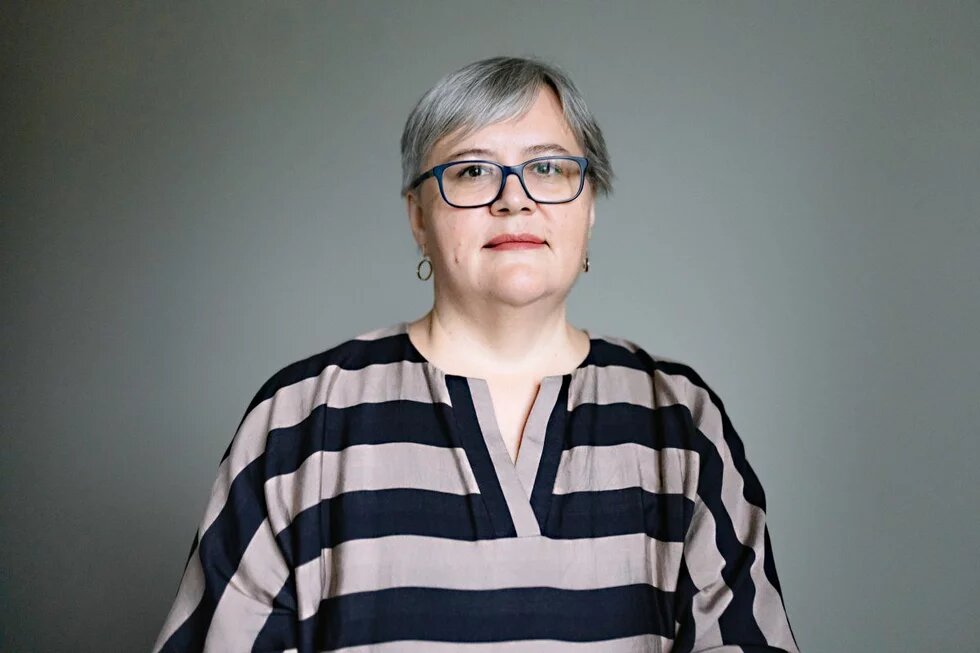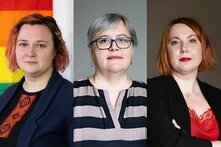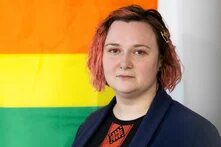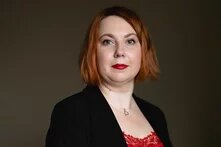Gender equity is Irina Alkhovka’s personal and professional passion. In 2021, the human rights campaigner had to leave her home country, Belarus, where she was being prosecuted for her political activism.

Coincidentally our conversation with Irina takes place on the International Day for the Elimination of Violence against Women. “This is a day,” says Irina, “when I reflect on why it is that for 25 years I’ve been dealing with this issue – where I go from here and whether my goals have changed.” I’m glad to be a witness to her reflections. Irina tells me that, in Belarus, this 25 November had always been more intense for her than now that she’s living in exile. Back then, journalists had always been on the lookout for heroines, statistics, and data to use for pieces to be published on that day – as it was still a fairly new topic. It was only in 2008 that the United Nations began their campaign “16 days of activism against gender-based violence.”
The great goal – gender equity
In Belarus, Irina held senior roles in organisations such as the Young Women’s Christian Association (YWCA) and La Strada Belarus, which fights against human trafficking. Subsequently she created her own non-governmental organisation (NGO), Gender Perspectives. In 2021, after eleven years of outstanding work, her organisation was banned by the government during a campaign targeting civil society groups. As she was being prosecuted for her women’s rights activism, Irina had to flee the country, and she is now living in exile. She prefers not to discuss her current activities.
Her forced exile has given Irina the opportunity to consider things from a distance, to find her feet anew, and to review what she’s achieved. “In our day-to-day work,” she says, “we often go on and on – and overlook certain things. The older I get, the more important it becomes to me, to see what has already been done, and what avenues my colleagues and the entire Belarusian women’s movement have explored.” Her goal, to campaign for gender equity, has not changed. Yet her approach has evolved. She’s learned to look at things from new angles and to take self-love more seriously. These days, she’s trying to remind herself that she is doing “enough.”
From sociology to feminism
In 1996, Irina defended her diploma in sociology at the Belarusian State University. Her thesis discussed the gender-specific aspects of history – and, at the time, even using the term “gender” was seen as a shocking innovation. Irina remembers that, while working on her thesis, she was only able to track down a single source in the university library that even used the term. “Gender” was such a novel and unfamiliar word, including for Irina and her supervisors, that she decided to employ more seasoned terminology most of the time and discuss the “women’s movement” and “women’s rights” instead. Still, this didn’t help her work to break into the mainstream, and Irina remembers well that the examination committee labelled her thesis “demanding” and “overly ambitious.”
Back then, Irina didn’t identify as a feminist. There were no women she knew who did – and she wanted to avoid becoming an “easy target” for criticism. She tells me about a major women’s conference in the 2000s with attendees from Ukraine, Moldova, Belarus, and Russia, and how one speaker declared that she was “no feminist”, as she was “married with children.” Irina couldn’t grasp how being married and having children made it impossible to be a feminist. She explains that she began to identify as a feminist, “when I recognised that I fought against the discrimination of women, and that I wanted people to view women as human beings. – So of course I’m a feminist!”
Praise for the courageous pioneers
It is important for Irina that the work of previous generations of Soviet activists is being appreciated – women who didn’t identify as feminists, yet upheld feminist values.
These women, some of them retired, had the courage to join the women’s movement, learn some English, attend conferences, and go looking for more information – and that at a time, when there was no internet, no degrees in gender studies, and no translations of feminist classics were available. Irina emphasises that, at the time, it took a lot more courage to be a feminist – and she regrets that there’s no history of the Belarusian women’s movement.
Working on a law against domestic violence
Among today’s Belarusian activists it may appear odd to praise efforts undertaken while working alongside state officials, as the government has orchestrated a brutal clampdown against all critics since 2020. Not only will people get arrested and tortured because of what they say or do, wearing the “wrong” colour socks or liking the “wrong” posting will often suffice. It’s almost a miracle that Irina has evaded such a fate – and the more surprising how favourably she views the work of some state actors.
In 2018, Irina and other representatives of civil society (YWCA, Radislava, and others) were asked by the Ministry of the Interior to develop an outline for legislation against domestic violence. Their strategy included the mandatory participation of perpetrators in criminal justice programmes; support for victims of domestic violence; as well as clear rules regarding the administrative and penal liabilities for such offences. The recommendations made by the representatives of non-governmental organisations were published in government newspapers – a rarity in Belarus.
Today, this seems to be utterly unrealistic. Was it really the government that promoted such progressive legislation? Was the draft really meant to overhaul legislation in a way that included the angle of the survivors of violence? It’s strange but true – Irina points out that it was a joint initiative of different activists and organisations, yet, and she stresses this, the authorities did play a key role.
“I went to the ministry and talked to the officials there – and it’s nothing that I regret.”
When she talks about these times you can sense Irina’s enthusiasm. To her, this is not a case of supporting the authorities, it was an opportunity to promote the interests of women at the highest level – women, for example, that kept calling the hotline provided by her group. A little later she adds – and you can hear a touch of sadness in her voice:
“Now many say that the state authorities have been ungrateful – they threw us out, they oppressed us. And that’s the truth. Yet, on the other hand, we had done a lot to make the state our state – and for this I’m proud.”
Unfortunately there’s no happy ending – the draft law did not pass due to, on the one hand, the influence of patriarchal, pro-Russian forces and, on the other, because Belarus’ illegitimate president Alexander Lukashenko publicly spoke out against it.
Are women’s rights human rights?
A further area where Irina had to work hard to enlighten people were the human rights organisations, which, in Belarus, are typically represented by men. There were heated debates (and some still continue) on whether a women’s agenda could be part of a human rights agenda. Despite her confidence, when engaging in such debates, and her convincing reasons, Irina found these debates, above all, awkward. She had expected sympathy and support from her human rights colleagues, yet even here and on this issue she “had to fight for a place in the sun” and convince her allies that a women is a human being with her own rights.
Despite all of this, Irina kept going. For her it’s a question of alliances, and she is convinced that the defenders of human rights need to present a unified front, as every division would contradict the tenets of universal human rights which teach us that different groups are being discriminated against in different ways and thus need specific rights. The slow but steady change that is happening in human rights discourses encourages Irina: “When I joined the movement, it wasn’t called feminism or human rights – it was known as social work.”
The importance of perceiving change
For Irina, history is a spiral, something that repeats itself, and right now we are moving backwards – there’s regression, a rollback. On the one hand, she’s confident that Belarusian civil society has succeeded “to raise a generation that thinks differently – that views freedom as greatly important, and that would like for Belarus to become part of the European and international community.” To her, these people perceive discrimination and a lack of tolerance quite simply as a “kind of nonsense.” She acknowledges, however, that there are other Belarusians who attack what they call “gender ideology,” claiming that it’s corrosive of family, traditional values, and morality.
What matters for Irina is to offer people the opportunity to change their viewpoint. She calls herself a “bridging kind of woman” because to her, opponents of feminism are not enemies, and she’s willing to engage with them. Still, even for her there are limits and she will not put up with those who treat her profession “with contempt” and she will not be insulted. “I’m trying to remind myself of this and defend myself accordingly, yet, generally, I don’t think the world’s violent. We’re changing things by example, by being exemplary, and by showing others how to live in this world of ours.”
Giving back
One of the last projects she took on before her organisation was shut down in Belarus were so-called “Daddy Schools” for cisgender men. Despite the obvious difficulties of getting a male audience hyped up about gender equality initiatives, plus the pervasiveness of male domestic violence, this undertaking, too, inspired Irina: “There are men who are willing to change. They reflect and then they realise that they’ve grown up in a milieu where violence was the norm, that is, there own family.”
Lately people have asked Irina ever more often how she came to embrace feminism, what she’s experienced, and what she’s been part of. She thinks that many in the movement have lost all hope for change, yet this only makes it the more important for her to inspire women to believe in themselves, in their cause, and in humanity in general. Recently she overheard someone say: “The first part of your life is learning, the second is earning, the third is giving back.” In this, she recognises herself, and she believes that she has reached a point in her life, where it’s time to give something back.


